Romania's young history fans battle to save imperial spa resort
- Published

The magnificent Neptune Baths are in a state of decay after years of neglect
Nestled in a deep mountain gorge in southwest Romania, a group of students and young architects are trying to breathe life into a dilapidated thermal spa town that was once the playground of European elites.
Baile Herculane, which translates as Hercules' Baths, is famed for its natural warm sulphuric springs, originally developed by the Romans, and later by royalty of the Habsburg Empire.
After a visit in 1852, Austro-Hungarian emperor Franz Joseph said it was "the most beautiful resort on the continent". But after the fall of communism in Romania in 1989, the historic resort - including its grand old Neptune Baths which were once a hotspot for elites - was abandoned and fell into chronic decay.
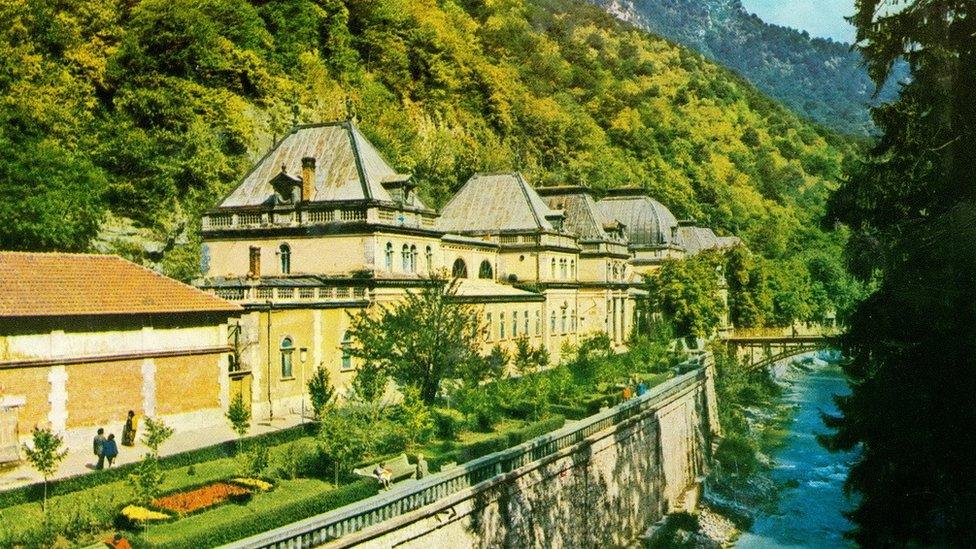
This photo of the Neptune Baths dates back to 1980, before the fall of communism in Romania
"I was sitting in front of the Neptune Baths building and all of the people passing by were complaining about the state of it," says Oana Chirila, a 26-year-old architect from Timisoara.
It was after her visit as a student in 2017 that she wrote a blog highlighting her dismay over the state of the Class A 19th-Century monument.
"I felt a strong connection with the building and the place, I was impressed by its beauty," she told the BBC. "After going back home, all I could think about was that building."

Oana Chirila (L) and Cristina Apostol decided to set up the project to save the 19th Century building
Her piece struck a chord with thousands of readers and she was inspired to set up an NGO with friend and fellow architect Cristina Apostol. Together they launched the Herculane Project, with the ambitious task of saving the historic thermal spa complex.
Standing outside the imposing 3,000 sq m (33,000 sq ft) structure, you grasp the scale of the task they face. It is a chilly winter's day and the pungent smell of sulphur rises from the shallow river below, its warm springs gently bubbling as they have done for millennia.
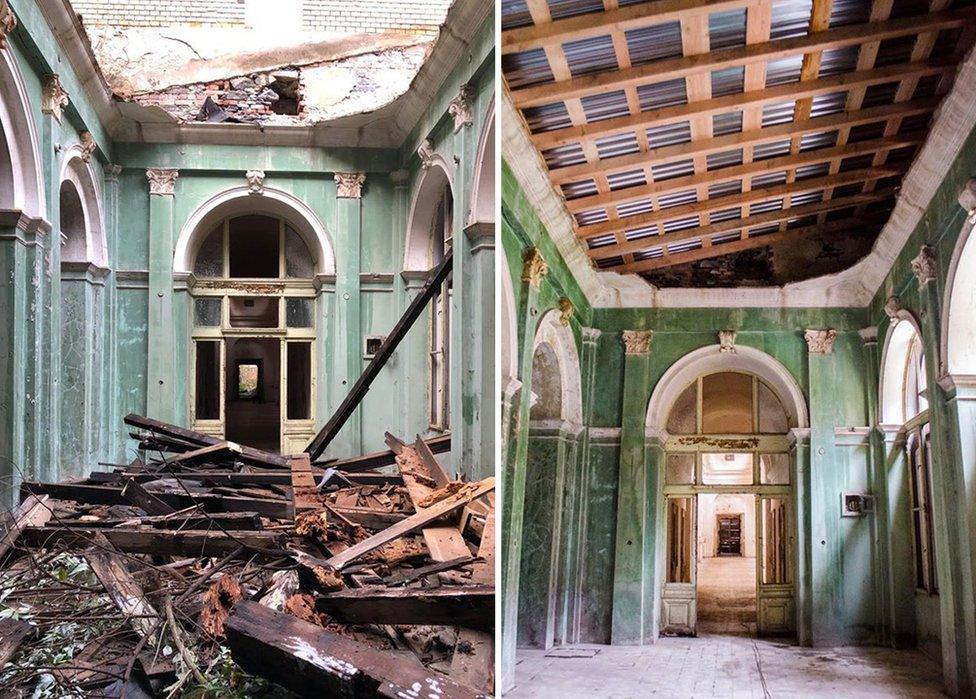
Initial efforts have been spent on securing the historic building's roof sections
"Our interventions, which have mostly been on the roof, can be hard to see," says Ms Chirila, who also works full-time as a project manager at a property development firm. "But we've done lots of interventions."
The team of about 25 volunteers is made up of architecture students, young graduates, web developers, and various others. So far they have raised around €75,000 (£66,000), but they estimate that about €12m would be needed to fully restore the historic spa.

The group of volunteers are made up of architects and a variety of other talented young people
Since the project's inception, they have added 12 sections of roofing, erected structural supports, and protected various interior and exterior relics - important works that have all helped to conserve the old building.
"For sure parts of the building would have collapsed. It's an uphill battle, but we've taken it upon ourselves to conserve the building," says Cristina Apostol, 28. "One of our really idealistic goals is to get everything here in historic Baile Herculane into Unesco."
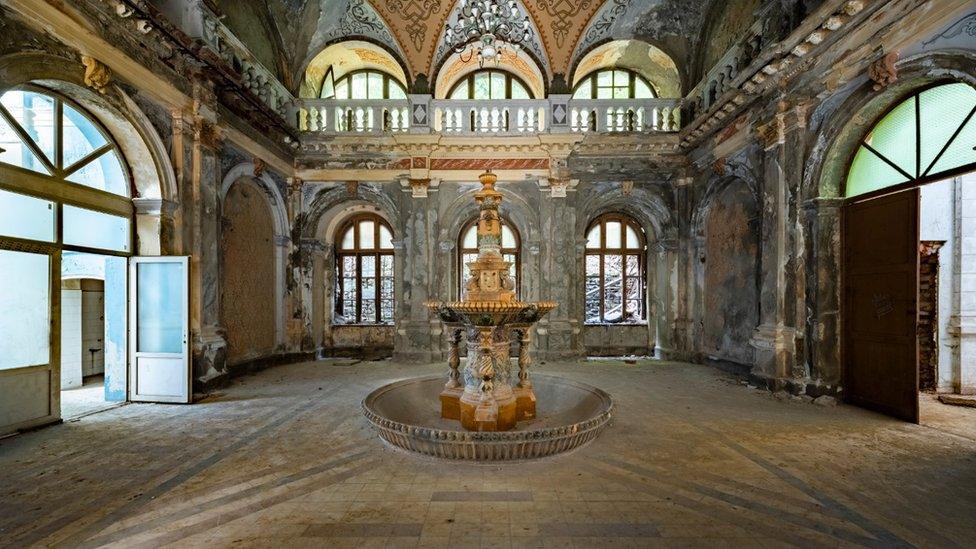
The Neptune Baths boast a grand pillared entrance that opens up into a large vaulted, frescoed lobby, its centrepiece an ornate Hungarian-made ceramic fountain, now secured with a wooden frame and covered with a tarpaulin to protect it from falling debris.
As we head inside, the haunting beauty of the building is alive with periodic sounds of crumbling bricks and mortar. The noises echo through long, almost symmetrical hallways and spa chambers either side of the lobby.
"This archway would have collapsed," says Ms Apostol, pointing to a large area now covered with a pinewood frame and temporary tin roof. All works, for now, must by law be reversible, she points out.
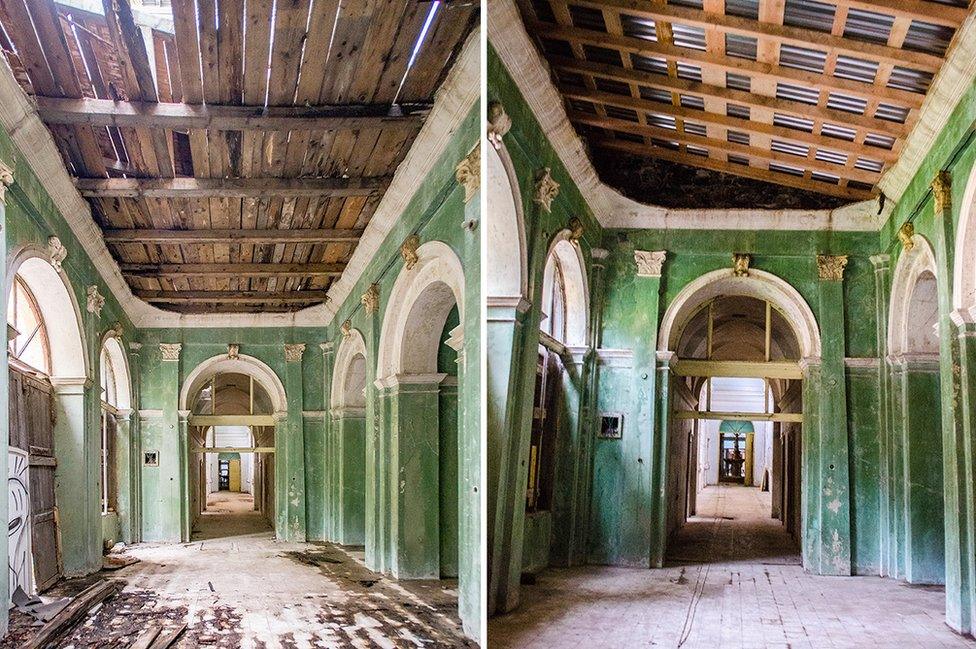
One of the team's efforts has been in preventing water from getting into the building, and their success is visible on the right
"We intervened on a wall that collapsed and, if we hadn't, the whole roof would have come down," she says.
The grand old spa is a significant part of the wider Baile Herculane historic resort, which is made up of an old casino, a Baroque villa named after Empress Elisabeth of Austria, Franz Joseph's wife, and a broad, cobbled promenade lined with hotels and punctuated with a statue of Hercules.
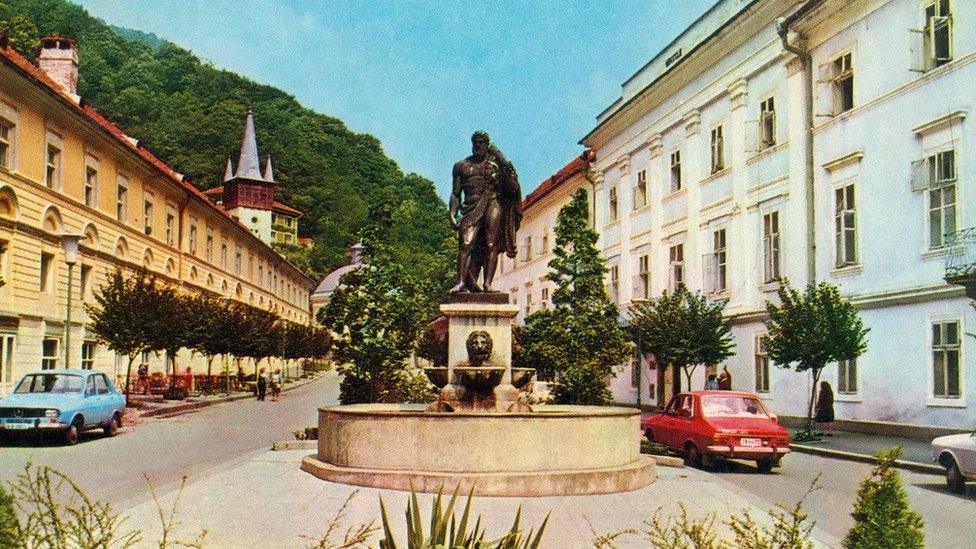
The old resort town of Baile Herculane, seen in this postcard from about 1980, is a shadow of its former self
"The concept was health and happiness," says Oana Chirila, as we tour the outside of the casino building, on the opposite side of the sulphur-rich river.
It is easy to envisage Baile Herculane as the bustling, luxury resort it once was. But the contrast with its glory days is stark.
Today it looks rundown, a sprawling new town adjacent to a dilapidated historic old town, and dotted throughout with brutalist, communist buildings.
Clearly frustrated by the slow pace of their work, Ms Chirila feels a responsibility to fight on.
"You have the sulphurous water, the resources, and available EU funds - it's a shame the government isn't accessing it," she says. "This place could bring lots of money for the state, and for the community."
The BBC contacted Romania's culture minister for comment but he did not respond.
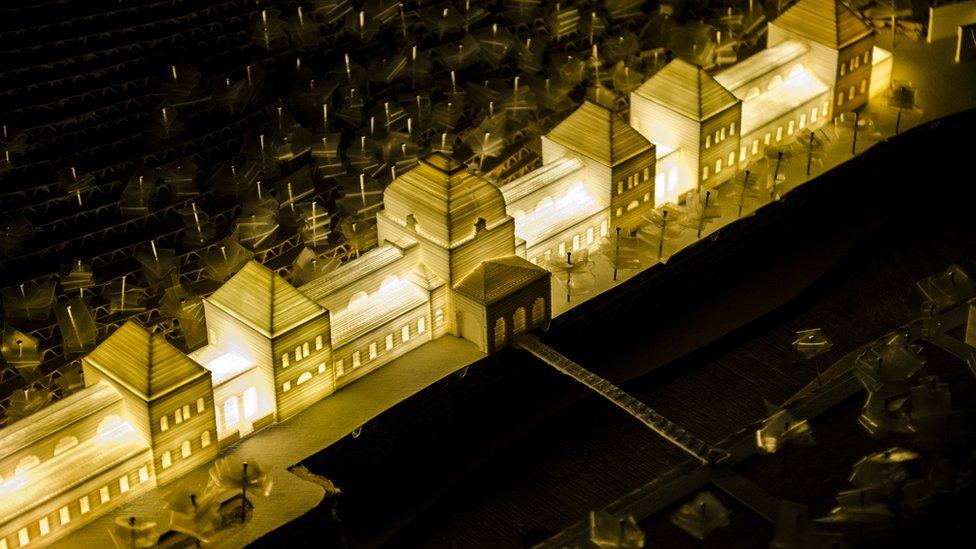
The volunteers have a dream for what the historic Neptune Baths building could become
The team's short-term goal is to raise around €30,000 (£26,000) to finish securing the Neptune Baths from irreversible decay. "This building needs constant maintenance," says Ms Chirila. But the volunteers dream of a brighter future and ultimately a fully restored, functioning spa.
Cristina Apostol imagines the spa at the centre of a complex that includes a museum, a book store, and a coffee shop.
For now, the young team will have to make do with trying to prop up an important building in a once-glamorous spa resort.
"There's only so much civic society can do, then it's really up to the state."

More stories from Romania
Why one of Europe's last great beech forests is facing the chop.